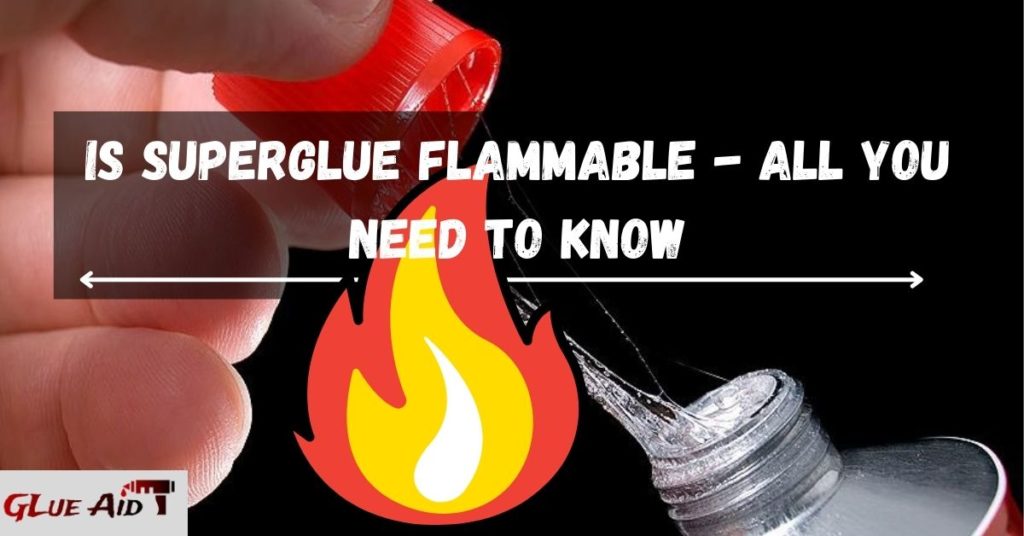Most people have worked with superglue at some point. If you have, chances are that you know of the hazards it might present, but have you ever stopped and wondered whether it is a fire hazard? For instance, is superglue flammable? We bet that has rarely crossed your mind.
Most people think of superglue as entirely safe, but that’s far from the case. That’s not to say it is dangerous to work with like some liquids we use. But if there’s any danger in working with, you are better off knowing it than not knowing, right?
Let’s look at whether superglue can be a fire hazard.
Table of Contents
Is superglue Flammable?
Yes, superglue is flammable. It isn’t explosive to the levels of gasoline or kerosene, but whenever you expose it to a fire source, it will ignite and burn after some time. It won’t readily spark into flames after brief contact with fire. But if you expose it to the fire for a considerable time, it will burn.
There’s a caveat to the levels that superglue is flammable. If it is in liquid form, it will burn more readily than dried. Superglue contains a compound called cyanoacrylate, which confers the adhesive properties that make it worthwhile.
The cyanoacrylate is the reactive agent in superglue and the one that catches on fire when you expose superglue to a flame. Does this mean that superglue can explode if exposed to heat?
No, it doesn’t. But under sustained exposure to heat, superglue will burn. Therefore, superglue is a safe product to use if you use it in safe and controlled environments where you won’t expose it to fires or flames for a considerable amount of time.
What Happens When You Boil superglue?
Liquid superglue will only evaporate when you place it inside a pan and boil it. However, the main issue is producing toxic fumes that might irritate your nose and eyes. That isn’t an exercise you would want to try in a confined space, since it could be potentially dangerous.
After evaporation, liquid superglue will leave behind a sticky brown residue that lacks the glue’s adhesive capacity. It will feel runny when you hold it with your gloved fingers and won’t be of much use to anyone as an adhesive.
If you are curious to see what happens when you boil superglue and want to try it, ensure you do in an open space where the air is running free. That way, you can protect yourself from the toxic fumes that the glue will produce as it evaporates.
Read Also: Is Mod Podge Flammable
What Temperature Does Superglue Catch Fire At?
After sustained exposure to a fire flame or heat, Superglue will catch on fire at 187 degrees Celsius. That means you need a lot of heat for a sustained amount of time for superglue to catch fire.
Since most of the situations we use superglue in at home and in the office aren’t that close to the mentioned temperatures, superglue is relatively safe to use. It isn’t quite the hazardously flammable liquid that petrol or diesel is.
However, that doesn’t mean hot superglue is something to touch. Although the adhesive properties will be low, touching hot glue could have disastrous consequences for you. So don’t try lighting glue without the protective clothing it needs.
What Temperature Does Superglue Melt At?
Superglue will require intense heat to melt. It melts at a temperature of 187 degrees Celsius. Again, there isn’t any consumer hardware that will get to that high temperature, making superglue a safe product to use.
The temperature at which superglue melts is around 86° Fahrenheit. The lower the temperature the more viscous the glue, so it will take longer to melt, and higher temperatures will cause it to melt faster. It is best if you stay within the 60-90 degree range with most superglues because they are not designed for extreme heat or cold.
What Glue Is Not Flammable?
Most water-based glues have a low flammability rate as compared to oil-based glues. The most common adhesives that don’t quickly burn are:
- PVA
- Wood Glue
- School Glue
Water doesn’t bond well with fires, so the flammability rate of the above water-based glues will be pretty low. That doesn’t mean they can’t burn; instead, it means you will need a lot of heat before making them burn. That’s why we consider them less flammable than some other types of glue.
What Are the Most Flammable Glues?
Superglue isn’t the only glue you will be working with if you are in an industry that heavily relies on glue. If you work with glue often, then it is only safe for you to know the glues that will readily burn and thus constitute a safety risk for you.
The below glues can quickly burn whenever you expose them to a fire or high temperatures.
- Model Glue
- Rubber Glue
- Spray Glue
If you are working with the above glues, do not expose them to high temperatures for a prolonged amount of time.
Read Also: Is Krazy Glue Flammable and Heat Resistant?
FAQ About Is Superglue Flammable
Can superglue cause a fire?
Generally, superglue isn’t a fire hazard under average temperatures. However, when it gets into contact with cotton or wool, there might be a severe reaction resulting in a fire. Always ensure glue doesn’t get into contact with the mentioned materials.
Can superglue burn my skin?
Superglue won’t burn your skin unless it contacts your skin through your clothes. The clothes, however, need to be cotton. It reacts vigorously with cotton and might even cause a fire.
When superglue touches your skin, the only issue is that it might become a problem to remove it safely. If the glue touches your skin in large amounts, it will require a medical procedure to remove it. Better stay safe and not have it touch your skin.
Can superglue conduct electricity?
No. Superglue is a compound of polymers like plastic. It thus doesn’t conduct electricity. That’s why sometimes you will find people using it to hold together broken wires.
What are the dangers of using superglue?
Possible dangers of using superglue include severe allergic reactions, the potential for severe blistering, and permanent scarring. If glue is accidentally ingested, serious internal injuries may occur. Using super glue can cause prolonged eye damage, serious respiratory complications, and it is often difficult to remove. It is recommended to wear rubber gloves when using super glue because it can cause skin irritation.
Is Super glue fire resistant?
Super Glue is not fire-resistant. It melts at around 150 degrees Fahrenheit. It also emits small amounts of toxic fumes. Superglue, like most adhesives, is not fireproof. It will melt around 150 degrees Fahrenheit (depending on the type of glue) and has some toxicity to it, but is generally safe to use with other materials that are non-flammable or heat-resistant.
Is Super glue okay with heat?
A common question is if super glue can handle the heat. A common answer, mostly true, is that the higher the temperature, the less likely it will work. So essentially, the hotter it gets outside, the more likely it will melt and no longer be able to function as something to glue things together.
Read Also: Is Glue bad for your Skin -Things You Must Know
Final Thoughts
Is superglue flammable? Yes, it is. But you need high temperatures to make superglue burn. Therefore, it doesn’t constitute a hazardous material to work with at home or in the office. It doesn’t burst into flames like other volatile liquids when you burn it.
That, however, doesn’t mean it’s a safe idea to expose it to fires or high temperatures for prolonged amounts of time.
Relevant Resources:
- Why is Super Glue Age Restricted? Know the Reason Behind This
- How to Fix a Hole in an Air Mattress With Super Glue
- Does Super Glue Work on Rubber
- Is Super Glue Conductive
- Can You Super Glue Wires Together – Best Guides Ever
- Is Super glue Waterproof
- Can You Use Super Glue for Fake Nails
- How Long Does Super Glue Take to Dry
- What Temperature Does Super Glue Melt




